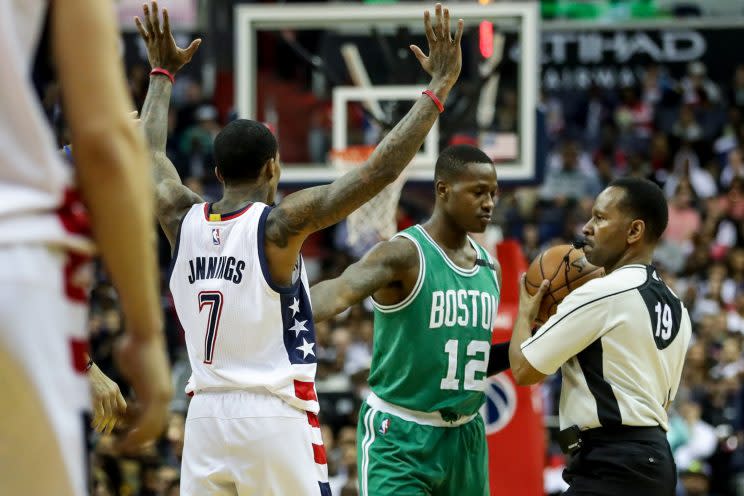Celtics, Wizards and the old 'role players play better at home' cliché

Washington Wizards star John Wall said it twice after losing a third straight road game to the Boston Celtics in the Eastern Conference semifinals: “Role players play better at home.” It’s an old NBA cliché — one we trust as fact, if only because it always seems to be true, and especially so in this series.
So, is it true, at least as this strange series of mostly lopsided home victories is concerned? The answer, of course, is more complicated than a simple yes or no, but essentially role players play better at home because most everybody plays better at home — a good sign the Wizards can force a Game 7 and a bad omen for their chances to reach the conference finals. But let’s dive deeper on this one.
It only seems fitting this becomes a topic of conversation in an Eastern Conference semifinals wrought with actual feuds between Kelly Oubre and Kelly Olynyk as well as Terry Rozier and Brandon Jennings.
[Follow Ball Don’t Lie on social media: Twitter | Instagram | Facebook | Tumblr]
For this exercise, we’ll consider Wall, Bradley Beal, Isaiah Thomas and Al Horford as the stars of this series. Guys like Markieff Morris and Avery Bradley might be more than role players, but we should all be able to agree that the Wizards and Celtics each have two very clear names atop their mastheads.
Boston’s stars have been remarkably efficient all series, but far more productive at TD Garden. Thomas and Horford are averaging a combined 53 points on 33.3 shots and 10 free throw attempts per game at home (a 70.2 true shooting percentage), compared to just 29.5 points on 20 shots and 6.5 free throws in Games 3 and 4 on the road (a 64.5 true shooting percentage). Their assist numbers have also seen a similar decline, falling from 14 per game combined in Boston to only 8.5 in Washington.
Whether Isaiah and Al aren’t matching that offensive effort in Washington or the Wizards are rising to the defensive occasion at home, the C’s stars are generating 35 fewer points per game on the road.
Same goes for Boston’s role players. Celtics not named Thomas or Horford have seen a dip in true shooting percentage from Boston (59.1) to Washington (48.8). They’re also committing more turnovers on the road (11 per game) than they are at home (7.7). The difference is similarly stark, although some of that slip in role player production might result from Thomas and Horford struggling to facilitate.
The Wizards are floating a similar boat, even if they’re not seeing quite as drastic a change in tide. At home vs. on the road in this series, Wall and Beal are shooting more efficiently (54.8 vs. 51.2 true shooting percentage) and taking better care of the ball (2.6 vs. 1.8 assist-to-turnover ratio). All other Wizards are also shooting better and creating more in Washington (63 true shooting percentage and 16 assists per game) than they are in Boston (55.3 true shooting percentage and 10.3 assists per game).
“Every team is different at home than they are on the road,” added Wall. “You play great at home, because you’ve got the fans there. Role players always play great at home. In this series, we have to go back, do what we have to do to win Friday and come back here and try to win Monday. That can be the last game of the series, and there ain’t going to be no other home game if we don’t win. The role players and the stars have to come out and play at a high level from the start for 48 minutes.”
Yes, but why are both teams playing so much better at home? “You’ve got the fans there” can’t be the only explanation for why “you play great at home,” can it? Both Wall and Thomas surmised it could be a reflection of increased effort at home, suggesting the more physical team has won every game of the series. Rebounding statistics certainly bear that out. The Celtics — one of the league’s worst teams on the boards during the regular season — have battled a lengthier Washington team to a 127-127 draw on the glass in Boston, while the Wizards own a plus-26 rebounding margin in two games at home.
“They were the more physical team today,” Wall said after Boston’s dominating 123-101 home win gave the C’s a 3-2 series lead on Wednesday, “so throughout this whole series, whoever the most physical team is has won every game. Like I talked about before we came here to play Game 5, you have to be a physical team if you want to win, and tonight, give them credit, they were the most physical team.”
Is it merely a matter of trying harder at home, wanting to win that much more for your fans and riding the emotional high of the crowd, or do players just feel more comfortable at home? From waking up in their own bed to warming up on a familiar basket, players should fall into a routine more easily, and NBA players, if nothing else, are creatures of habit. You’d think shooting statistics might reflect that.
If we agree offenses make more of their open shots if they’re comfortable and defenses give up more open shots if they’re lacking effort, then teams should take and make more open shots at home — that is, if they’re more comfortable in their own city and their opponent’s effort suffers as a visitor.
“Role players play better at home,” Wall said again after shooting just 7-for-17 on Wednesday, “and we’ve got to do a better job of keying on guys and not giving them open looks, because the last two games [at home] we were contesting just about every shot. Tonight they got easy looks.”
True to form, the Wizards were a much more accurate and prolific shooting team on open or wide-open shots at home (49.4 percent on 41.9 shots) than they were on the road (39.7 percent on 35.3 attempts) during the regular season, according to Synergy Sports. It’s an open-and-shut case, then.
Not so fast. The Celtics owned nearly identical numbers on open and wide-open shots both at home (43.5 percent on 40.9 shots) and on the road (42.8 percent on 40.9 shots) this season. So, maybe some teams try harder and play more freely at home, while others play just as hard and comfortably on the road? Any coach whose roster falls fits the latter description would deserve a heap of credit.
Somehow, the opposite has been true in the playoffs. The C’s are taking 3.2 more open shots in the Garden and making them at a 14.6 percent higher clip in this series. Conversely, the Wiz are getting almost five fewer open shots per game at home and shooting a tick worse on those attempts at the Verizon Center in the conference semis (48.8 percent in Boston; an even 48 percent in Washington).
Yet, here we are in a 3-2 series, the home side has won each game, and the two teams look like completely different outfits depending on where they’re playing. “Role players play better at home” is a nice explanation, because it simplifies years of home-court advantage data to a cliché. But it doesn’t explain how the Wizards dominated Game 4 sans the suspended Oubre, one of their few key reserves.
It’s more difficult to quantify something like momentum — a team feeding off the crowd and a crowd feeding off the team in a synergetic kinesis that explodes into a decisive 26-0 run like the one the Wizards unleashed in the third quarter of Game 4 in Washington. Sometimes the road team collapses on itself without fans to rally behind. Or maybe it’s even more random and inexplicable than that.
Game 6 danger: WAS has lost 7 straight elimination games at home: 1997 vs MJ; 2005 vs DWade; 2006-08 vs LeBron; 2014 vs IND; 2015 vs ATL
— Michael Lee (@MrMichaelLee) May 11, 2017
Somehow, someway, 10 of the 11 series completed so far in these playoffs have featured a road close-out game, and the visiting team has won all 10. The Celtics have the 11th such opportunity on Friday.
It seems possible, probable even, that home-court advantage is entirely mental. These clichés are thrown around all the time — “a series doesn’t really start until the home team loses,” or “all we need is a split on the road” — and players hear them so often they fall into their trap, taking the foot off the gas on the road because they really just have to take care of business at home until they need one on the road. Wizards coach Scott Brooks admitted as much entering Game 5, when he said, “If we want to advance, we have to win a game up there. So we’re looking at this as the first crack to do that.”
That’s not the approach anybody should be taking, because by not treating Game 5 as a must-win, you’re possibly missing out on a close-out Game 6 at home or just putting that must-win feeling on hold for Game 7, when everything is cranked up to 11 and the mental game of playing on the road can really take hold. This is easier said than done, of course, because it’s in our nature to procrastinate.
This may also explain why Game 6 has proven so difficult for home teams in these playoffs. Visitors are feeding off the energy of, “We can win this thing tonight,” while the hosts and their crowd can succumb to the nerves of this being it for their season, and suddenly the mental advantage is flipped.
Avery Bradley: "There's not a better feeling than closing out a series on someone else's court."
— Jay King (@ByJayKing) May 12, 2017
This is just a working theory, because something has to explain why every important bench player in this Celtics-Wizards series has a better career shooting percentage at home. That can’t be random.
If “role players play better at home” is indeed all mental, the plus side for the Celtics on Friday night is that it must also be something they can overcome with increased focus and the right approach.
Nobody proved that better than San Antonio Spurs wing Jonathon Simmons playing in place of the injured Kawhi Leonard in Thursday’s dominating Game 6 road win against the Houston Rockets. During the broadcast, Jeff Van Gundy probably said it best: Teams don’t just play better because they’re at home; they have to play well first, and then they can feed off the crowd. And Houston played terribly.
We’ll find out how the Wizards respond in Washington. There might be some truth to the old cliché about role players stepping up at home, but relying on that cliché never won a series for a road team.
– – – – – – –
Ben Rohrbach is a contributor for Ball Don’t Lie and Shutdown Corner on Yahoo Sports. Have a tip? Email him at rohrbach_ben@yahoo.com or follow him on Twitter! Follow @brohrbach



